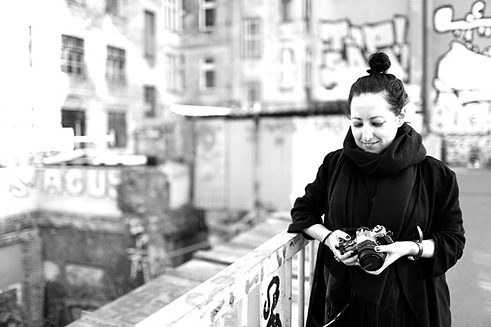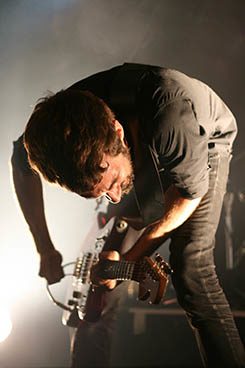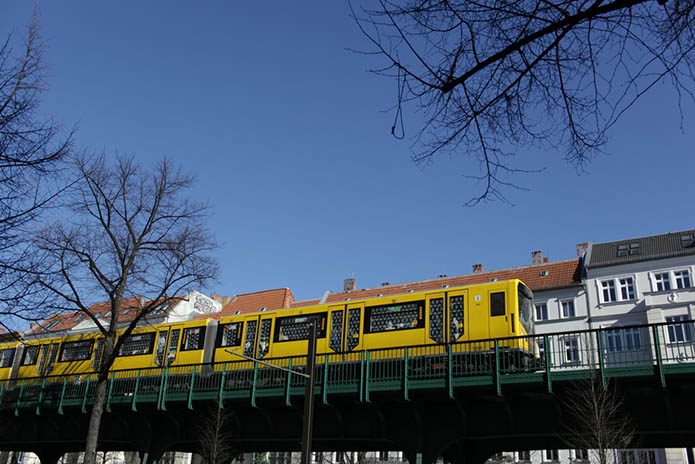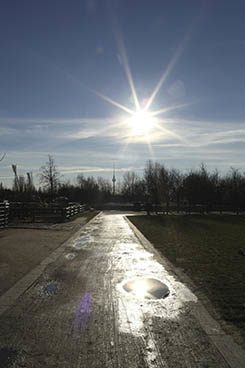Bicultural Urbanite Brianna
Love at Second Sight

Fiona Laughton is a storyteller whose story doesn’t quite fit the mould. Unlike the many young tourists and creatives who fall in love with Berlin and vow to stay at all costs, her decision to emigrate was driven by a desire to escape. After several years contesting the Sydney rat race, the copywriter and photographer wanted out. She discovered she was eligible for a German freelance visa and suddenly Berlin seemed like an appealing exit strategy.
When Fiona visited Berlin as a backpacker in her twenties, she stayed in a residential part of the city and hit the museums rather than the clubs. She was charmed by the calm and beauty of the snow-covered capital. “I didn’t have the typical Berlin nightlife experience…and I never thought ‘oh my gosh, this is where I want to move’,” she explains. But after arriving in the winter of 2013, she knew she’d made the right decision. While most foreigners dread the long months of darkness, Fiona loves the season’s empty streets and serenity. “It was cold and empty and quiet and I think after Sydney being so hectic and always too hot for me, I really enjoyed it. Everyone told me to wait until summer, that it gets so much better, but I liked the snow and the grey skies. It was completely different to what I’d experienced in Australia”.
 Gareth Liddiard from the Drones.
| © Fiona Laughton
In Sydney, the Melbournian worked in marketing and as a content editor for a major media corporation, where she helped to produce editorial content for its website, including TV, film and live music reviews. This role also enabled her to try her hand at professional photography. Whereas in Germany, some form of qualification is required for just about every kind of employment, no matter how mundane, while Australia has a comparatively open-minded approach to recruitment and understands the value of transferrable skills. “I started writing about live music and there was an option to get photo passes, so I was able to combine all my loves together and get paid for it,” Fiona recalls. Here in Berlin she would need to apply for an additional press accreditation to continue shooting gigs. Put off by the red tape, she began exploring portraiture and other forms of photography. “I’m also enjoying just being a punter and not having to worry about taking my camera out. Let’s be honest, there’s not really any money in it either, so I’d rather just go and enjoy the concert.”
Gareth Liddiard from the Drones.
| © Fiona Laughton
In Sydney, the Melbournian worked in marketing and as a content editor for a major media corporation, where she helped to produce editorial content for its website, including TV, film and live music reviews. This role also enabled her to try her hand at professional photography. Whereas in Germany, some form of qualification is required for just about every kind of employment, no matter how mundane, while Australia has a comparatively open-minded approach to recruitment and understands the value of transferrable skills. “I started writing about live music and there was an option to get photo passes, so I was able to combine all my loves together and get paid for it,” Fiona recalls. Here in Berlin she would need to apply for an additional press accreditation to continue shooting gigs. Put off by the red tape, she began exploring portraiture and other forms of photography. “I’m also enjoying just being a punter and not having to worry about taking my camera out. Let’s be honest, there’s not really any money in it either, so I’d rather just go and enjoy the concert.”
THE FREELANCE DREAM
Establishing yourself as a freelancer in a foreign country with one of the world’s most complicated taxation systems is no small task. The ongoing administrative effort is immense and “you have to be your own project manager, your own boss, your own marketer, your own arse-kicker”. But when the payoffs include choosing your own hours, collaborating with clients you actually find interesting and working at home in your pyjamas, it’s easy to understand the appeal. Fiona enjoys the flexibility of the digital nomad life: “I can take my work anywhere. I could technically go and work in another city or county and anywhere with an internet connection.” The U2 subway line in Prenzlauer Berg.
| © Fiona Laughton
Berlin’s start-up scene appears to be thriving and Fiona has worked on dozens of exciting projects, but laments the frequent budget battles. “You waste a lot of time negotiating,” she says. “A lot of people expect things for minimal cost and that’s frustrating. Sometimes they want to pay you minimum, or less than minimum wage.” She believes people underestimate the skill and time it takes to produce good copy and Berlin’s ever-expanding English-speaking community means there’s tough competition among copywriters to score the clients that actually pay a decent rate. “There’s a lot of people here doing what I’m doing.”
The U2 subway line in Prenzlauer Berg.
| © Fiona Laughton
Berlin’s start-up scene appears to be thriving and Fiona has worked on dozens of exciting projects, but laments the frequent budget battles. “You waste a lot of time negotiating,” she says. “A lot of people expect things for minimal cost and that’s frustrating. Sometimes they want to pay you minimum, or less than minimum wage.” She believes people underestimate the skill and time it takes to produce good copy and Berlin’s ever-expanding English-speaking community means there’s tough competition among copywriters to score the clients that actually pay a decent rate. “There’s a lot of people here doing what I’m doing.”
REVERSE CULTURE SHOCK
After four and a half years of Bratwurst and BVG, the expat copywriter decided it was time to take a trip back to Melbourne. The temptation of so many appealing European destinations on her doorstep meant that her travel funds had initially been spent exploring her adopted continent. But eventually the novelty of the Berlin winter began to wear thin and Fiona was ready to head home and reconnect with friends and family. “There were a lot of culture shock moments,” she laughs. “I found it extremely loud, being out in bars and restaurants. I found that Australians like to congregate in groups, especially in bars and talk very loudly, like to the point of shouting. I also found that everyone wanted to talk to me, from the baristas to the bar keepers, and I couldn’t work out why. Even though I like a chat normally and here in Germany I sometimes miss it, but I found it really challenging in Australia.” After so many years away, something had changed: “I definitely felt a shift within myself. I don’t feel German, but I definitely don’t feel one hundred percent Australian, whatever that means. I’m somewhere in the middle now.” The winter sun over Mauer Park.
| © Fiona Laughton
Culturally speaking, Fiona admires how Germans treat their Privatsphäre with greater caution than your average Australian. While Australians will happily tell you their life story shortly after being introduced, Fiona’s German friends took longer to reveal their private lives and opinions. Although this was sometimes frustrating, she prefers the slow boil of German friendships and relationships to the microwave zap of oversharing Aussies. Fiona also admires Germans’ ability to keep their working and private lives separate: “I had a full-time job here in Berlin and the office culture was very different to an Australian office culture, where you talk about what happened on some TV show or sport and what you did on the weekend. Germans are not so willing to mix their work and private lives and I think that can be really healthy.”
The winter sun over Mauer Park.
| © Fiona Laughton
Culturally speaking, Fiona admires how Germans treat their Privatsphäre with greater caution than your average Australian. While Australians will happily tell you their life story shortly after being introduced, Fiona’s German friends took longer to reveal their private lives and opinions. Although this was sometimes frustrating, she prefers the slow boil of German friendships and relationships to the microwave zap of oversharing Aussies. Fiona also admires Germans’ ability to keep their working and private lives separate: “I had a full-time job here in Berlin and the office culture was very different to an Australian office culture, where you talk about what happened on some TV show or sport and what you did on the weekend. Germans are not so willing to mix their work and private lives and I think that can be really healthy.”